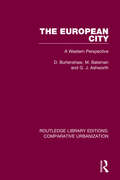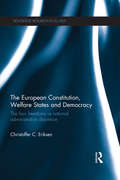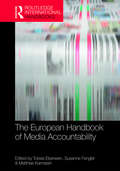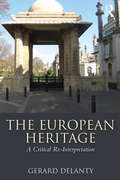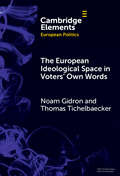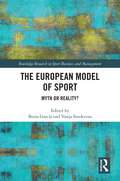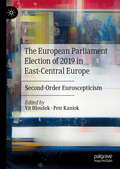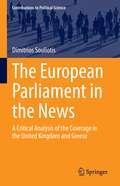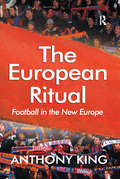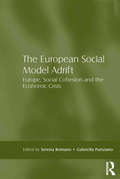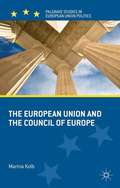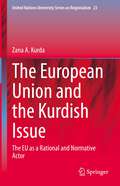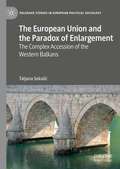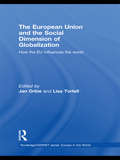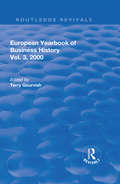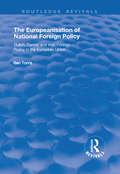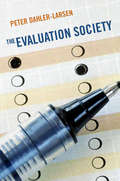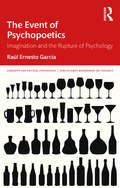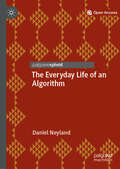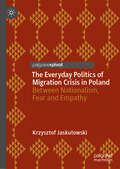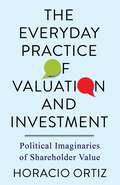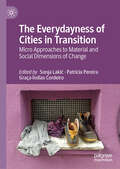- Table View
- List View
The European City: A Western Perspective
by G. J. Ashworth D. Burtenshaw M. BatemanOriginally published in 1991, this book focusses on the philosophies, histories and processes which have made the West European city system rich in internal variety yet distinct from that of the rest of western industrialised urban society. It synthesizes international experiences in particular aspects of urban policy making, with reference to Germany, France and Benelux. The book covers urban planning in its broadest sense – from economic, socio-spacial, recreational, housing and transport perspectives.
The European Constitution, Welfare States and Democracy: The Four Freedoms vs National Administrative Discretion (Routledge Research in EU Law)
by Christoffer C. EriksenThis book explores how the right to the free movement of goods, persons, services and capital in the European Union legal order affects welfare states. These "four freedoms", as they are known, are vital instruments for the protection of a European market unencumbered by internal frontiers. The European Constitution, Welfare States and Democracy explore the relationships and conflicts that have emerged between the European constitution and the legal regulation of mixed economies and markets within welfare-states. In particular, it examines the threat posed to the discretionary powers enjoyed by national governments and administrative authorities. Christoffer C. Eriksen has undertaken a comprehensive analysis of a series of judgments in which the European Court of Justice has clearly indicated the ways in which the four freedoms may be incompatible with the current practice of entrusting national administrative authorities with discretionary powers and thus highlights how the four freedoms are provoking democratic dilemmas, previously neglected in the academic literature. The book is written in a style which communicates beyond an audience of specialized legal scholars and although it includes analysis of black letter law, its methodology also draws from the disciplines of philosophy, political science, and sociology.
The European Football Championship: Mega-Event and Vanity Fair (Football Research in an Enlarged Europe)
by Basak Alpan Alexandra Schwell Albrecht SonntagThe UEFA European football championship was the first European mega-event to take place in post-socialist Europe. Taking this as a departure point, this volume focuses on football as a realm of constructing and negotiating identities using rich ethnographic fieldwork and in-depth media analysis.
The European Handbook of Media Accountability (Routledge International Handbooks)
by Matthias Karmasin Tobias Eberwein Susanne FenglerIn recent years, the Leveson Inquiry in Great Britain, as well as the EU High-Level Group on Media Freedom and Pluralism, have stirred heated debates about media accountability and media self-regulation across Europe. How responsible are journalists? How well-developed are infrastructures of media self-regulation in the different European countries? How much commitment to media accountability is there in the media industry – and how actively do media users become involved in the process of media criticism via social media? With contributions from leading scholars in the field of journalism and mass communication, this handbook brings together reports on the status quo of media accountability in all EU members states as well as key countries close to Europe, such as Turkey and Israel. Each chapter provides an up-to-date overview of media accountability structures as well as a synopsis of relevant research, exploring the role of media accountability instruments in each national setting, including both media self-regulation (such as codes of ethics, press councils, ombudspersons) and new instruments that involve audiences and stakeholder groups (such as media blogs and user comment systems). A theoretically informed, cross-national comparative analysis of the state of media accountability in contemporary Europe, this handbook constitutes an invaluable basis for further research and policy-making and will appeal to students and scholars of media studies and journalism, as well as policy-makers and practitioners.
The European Heritage
by Gerard DelantyGerard Delanty offers a critical interpretation of the European heritage today in light of recent developments in the human and social sciences, and in view of a mood of crisis in Europe that compels us to re-think the European past. One of the main insights informing this book is that a transnational and global perspective on European history can reorient the European heritage in a direction that offers a more viable way for contemporary Europe to articulate an intercultural identity in keeping with the emerging shape of Europe, and with its own often acknowledged past. He argues that the European heritage is based less on a universalistic conception of culture than on a plurality of interconnecting narratives, and the inclusion of new voices and is being forged in new spaces of critical dialogue. Such a perspective opens up new directions for scholarship and public debate on heritage that are guided by critical cosmopolitan considerations that highlight contention, resistances, competition and dissonance. He argues that the specificity of the European dimension of culture is in the entanglement of many cultures rather than in an original culture. The cultures of Europe are not separated but have been shaped in close interaction with each other and with the non-European world. Nations are not therefore unique, exceptional or fundamentally different from each other. The outcome of such intermingling is a multiplicity of ideas of Europe that serve as shared cultural reference points.
The European Ideological Space in Voters' Own Words (Elements in European Politics)
by Noam Gidron Thomas TichelbaeckerThere is a broad consensus that the ideological space of Western democracies consists of two distinct dimensions: one economic and the other cultural. In this Element, the authors explore how ordinary citizens make sense of these two dimensions. Analyzing novel survey data collected across ten Western democracies, they employ text analysis techniques to investigate responses to open-ended questions. They examine variations in how people interpret these two ideological dimensions along three levels of analysis: across countries, based on demographic features, and along the left-right divide. Their results suggest that there are multiple two-dimensional spaces: that is, different groups ascribe different meanings to what the economic and cultural political divides stand for. They also find that the two dimensions are closely intertwined in people's minds. Their findings make theoretical contributions to the study of electoral politics and political ideology.
The European Model of Sport: Myth or Reality? (Routledge Research in Sport Business and Management)
by Borja García Vanja SmokvinaThis is the first book to present a critical analysis of the concept of the European Model of Sport (EMS). The EMS concept is widely used by policymakers at the national and EU levels, and by some sports organisations, yet it has never been comprehensively defined in official documents. This book asks whether the EMS is real or imagined, evaluates its significance in a rapidly evolving European context and for world sport more broadly, and compares it against other models of sport in different regions of the world. The first section of the book is a multi-disciplinary analysis of the EMS, putting the EMS in historical context and examining the concept from political, economic, socio-cultural and legal perspectives. The second section of this book looks at different models of sport within Europe, including Germany, the UK, Scandinavia and South-East Europe, and how they intersect with EU policy. The final section of this book looks at models of sport in North America, Latin America, China, Africa and the Arab World, highlighting key differences and similarities in order to illuminate our understanding of sport governance, policy and management around the world. Throughout, this book includes consideration of grassroots sport, going beyond traditional analyses that have focused primarily on professional sport. In an era in which sport represents a dynamic arena for competition between corporations, NGOs, international organisations and nation-states, this book is an essential reference for anybody with an interest in sport policy, sport governance, sport management, sport law, EU policy and law, the history of European integration or the relationship between sport and wider society.
The European Parliament Election of 2019 in East-Central Europe: Second-Order Euroscepticism
by Vít Hloušek Petr KaniokThis book provides an analysis of the European Parliament elections 2019 with a focus on East-Central European countries. The authors offer conceptual insights into Euroscepticism and discuss traditionally familiar concepts in a new light, pairing East-Central European Euroscepticism with visions of illiberal democracy, on the one hand, and showing the increasing Europeanisation of Eurosceptic parties in the region, on the other. The book combines a fresh and innovative conceptual treatment with rich and accurate empirical evidence in order to highlight the dynamics of Euroscepticism in "new" EU member states. Students and experts interested in EU politics, within academia and beyond, will find this volume particularly informative.
The European Parliament in the News: A Critical Analysis of the Coverage in the United Kingdom and Greece (Contributions to Political Science)
by Dimitrios SouliotisThis book analyzes the social legitimacy deficit of the European Parliament (EP) in the United Kingdom and Greece. It does so by considering it, partially, a communication deficit, and by addressing the relevant inadequacies of its communication and media relations performance. Following this approach, the book identifies and critically analyzes the problems that the European Parliament is facing in communicating and portraying itself to news websites in the United Kingdom and Greece, and offers potential solutions to the issues presented.The book provides an initial comparison of the scale of the problems that the EP is facing in its communication and media relations performance in Greece and in the United Kingdom, focusing on a number of prominent, carefully selected, impartial or pro-European websites. The failures of the EP to secure adequate levels of visibility on these websites automatically signify serious basic weaknesses in its communication strategy. This book identifies those weaknesses, their causes, and presents solutions on how to solve them. Therefore, this book is a must-read for students and scholars of political science and media communication, as well as policy-makers and practitioners interested in a better understanding of the European Parliament's social legitimacy and communication deficit.
The European Ritual: Football in the New Europe
by Anthony KingFootball constitutes a vivid public ritual in contemporary European culture through which emergent social solidarities and new economic networks have come into being. This fascinating and unique volume traces the transformation of European football from the 1950s to the present, focusing in particular on the dramatic changes that have occurred in the last decade and linking them to the wider process of European integration. The examination of football illuminates how the growing dominance of the free market has changed European society from an international order in which the nation-state was dominant to a more complex transnational regime in which cities and regions are becoming more prominent than in the past. The study is supported by detailed ethnographic accounts emerging from the author's fieldwork at Manchester United and interview data with some of the most important figures in European football at clubs including Juventus, Milan, Bayern Munich, Schalke and Barcelona. It also includes a highly topical examination of racism in European football.
The European Social Model Adrift: Europe, Social Cohesion and the Economic Crisis
by Serena Romano Gabriella PunzianoThis volume presents a new perspective for discussing the European social contract and its main challenges, bringing together single-nation and comparative studies from across Europe. Presenting both theoretical discussions and empirical case studies, it explores various aspects of social cohesion, including social protection, the labour market, social movements, healthcare, social inequalities and poverty. With particular attention to the effects of the international economic and financial crisis on social cohesion, particularly in the light of the implementation of so-called ’austerity measures’, authors engage with questions surrounding the possible fragmentation of the European model of social cohesion and the transformation of forms of social protection, asking whether social cohesion continues to represent - if it ever did - a common feature of European countries. Breaking new ground in understanding the future of Social Europe and its main dynamics of change, The European Social Model Adrift will appeal to scholars of sociology, social policy and politics, with interests in social cohesion, the effects of financial crisis and the European social model.
The European Union and the Council of Europe
by Marina KolbWith the increasing prominence of fundamental rights within the EU it increasingly interferes in the core competence of the Council of Europe. This book traces the EU and the Council of Europe relationship in the field of human rights marked by mutual interferences and overlap and explores which factors trigger cooperation or conflict between the two organizations. Investigating the cases of data protection, the fight against terrorism, challenging Roma discrimination, the Memorandum of Understanding and the Fundamental Rights Agency through the lens of an implementation literature and management studies-perspective, this book contends that the biggest threat to interorganizational cooperation is organizational self-interest, despite a shared policy outlook. The book furthers the agenda set by the literature in this field by providing a new theoretical framework and an in-depth empirical study of two main actors in the field of human rights protection in Europe from a political science perspective. "
The European Union and the Kurdish Issue: The EU as a Rational and Normative Actor (United Nations University Series on Regionalism #23)
by Zana A. KurdaThis book focuses on the European Union as an actor involved in the transnational Kurdish issue covering Turkey, Iran, Iraq and Syria. It demonstrates that, instead of being simply a humanitarian actor in the issue, the EU has considered its bilateral interests with the four states in question as well as its extent of acceptance in approaching the Kurdish issue. It has combined its traditional humanitarian/normative consideration with its geopolitical interests in relation to strategies related to the four states. This book provides a unique perspective on the EU as an actor in the Kurdish issue and from a wider perspective, it provides interesting insights into the EU’s interactions with geopolitics, which has become the topic of a lively scholarly debate in recent years. The book is a resource for researchers and students studying the European Union as a global actor, and for governmental or non-governmental professionals dealing directly with, or having interest in, the EU and/or Kurdish affairs.
The European Union and the Paradox of Enlargement: The Complex Accession of the Western Balkans (Palgrave Studies in European Political Sociology)
by Tatjana SekulićThis book sheds light on the contradictions underlying the European Union enlargement process, specifically to the Western Balkans, challenging the common assumption that the integration of an extended European space might be possible without mutual transformation of the institutions and agencies involved. Sekulić maps the institutional dimension of the accession process, and analyses how the conditionality principle shapes and constrains the space for negotiation within the EU. Combining ethnographic research with the discourse analysis of the European Commission’s reports and documents from 2008 to 2019 concerning the Western Balkan countries, the book also explores the perceptions and agency of the individuals involved in this process. The European Union and the Paradox of Enlargement will be of interest to students and scholars of European integration, the sociology of Europe and the EU, and Eastern European and Western Balkan studies.
The European Union and the Social Dimension of Globalization: How the EU Influences the World (Routledge/GARNET series)
by Jan Orbie Lisa TortellThis volume provides a comprehensive account of the European Union’s social role in the world, assessing the EU’s ability to shape the social aspect of globalization from both law and political science perspectives. Focusing explicitly on the EU, the authors address the extent of coherence between the Union’s international social objectives compared with the activities of the International Labour Organization (ILO) and with other EU foreign policy goals. Various dimensions of Europe’s global social role are addressed, including: the social dimension of EU trade relations the involvement of civil society in EU development policies the linkage between the EU’s internal and external ‘social model’ the export of Europe’s social acquis through enlargement and neighbourhood policies the EU’s international position on health, gender equality, children’s rights, and corporate social responsibility the role of the Union in the ILO The European Union and the Social Dimension of Globalization will be of strong interest to students and researchers in EU studies, Globalization studies, and Social Policy.
The European Union as a Small Power
by Asle TojeThe post-Cold War period is coming to an end. After a decade of foreign policy integration Europe faces multipolarity internally divided and externally weak. Toje argues that due to the lack of a workable decision-making mechanism the EU is destined to play the limited but distinct role of a small power in global politics.
The European Yearbook of Business History (Routledge Revivals)
by T. R. GourishThis title was first published in 2001. A collection of research and review articles, in English, on the history of private enterprise based in European countries, as well as studies of transnational, public and state corporations. The period of interest covers the 19th and 20th centuries.
The Europeanisation of National Foreign Policy: Dutch, Danish and Irish Foreign Policy in the European Union
by Ben TonraThis title was first published in 2001. This study questions whether the development of foreign and security policy co-operation within the EU has constrained or empowered Danish, Dutch and Irish foreign policy. This entails a study of the relationship between national foreign policy and EU frameworks for co-operation.
The Evaluation Society
by Peter Dahler-LarsenEvaluation—whether called by this name, quality assurance, audit, accreditation, or others—is an important social activity. Any public or private organization that "lives in public" must now evaluate its activities, be evaluated by others, or evaluate others. What are the origins of this wave of evaluation? And, what worthwhile results emerge from it? The Evaluation Society argues that if we want to understand many of the norms, values, and expectations that we, sometimes unknowingly, bring to evaluation, we should explore how evaluation is demanded, formatted, and shaped by the two great principles of social order: "organization" and "society." With this understanding, we can more conscientiously participate in evaluation processes; better position ourselves to understand many of the mysteries, tensions, and paradoxes in evaluation; and most effectively use evaluation. After exploring the sociology and organization of evaluation in this landmark work, author Peter Dahler-Larsen concludes by discussing issues that are critical for the future of evaluation—as a discipline and a societal norm.
The Event of Psychopoetics: Imagination and the Rupture of Psychology (Concepts for Critical Psychology)
by Raúl GarcíaThe Event of Psychopoetics overviews and investigates the notion of psychopoetics, a sociopsychological event that involves re-creative slips and that emerges under certain cultural conditions and power relations in the context of everyday interaction and through certain modes of dialoguing and conversing. This transdisciplinary text takes the reader through the thought processes of Deleuze, Guattari, Agamben, Maffesoli, Foucault, Butler, Haraway, and Braidotti, among others, addressing debates that are integral to the critique of psychology and its devices of subjectivization and normalization. Garcia takes a unique approach by reflecting on how psychopoetics contrasts institutionalized dialogues, while constantly emphasizing the generative and transformative potency of social worlds effectuated in the impetuous play of poetics. The book combines the rigor of academic research with the creative display of ideas that open diverse, suggestive lines of reflection on everyday interlocution and its possibilities of reinvention, modes of social existence, and the relation between subjectivity and the designs of power. A truly unique reading experience, this book is ideal for students, instructors, and researchers in the fields of philosophy, social psychology and sociological thought, discourse studies, literary theory, and cultural analysis.
The Event of the Thing
by Michael MarderJacques Derrida's writings often embed the key themes of deconstruction in a notion of the thing. The Event of the Thing is the most complete examination to date of Derrida's understanding of thinghood and its crucial role in psychoanalysis, ethics, literary theory, aesthetics, and Marxism. Arguing that the thing, as a figure of otherness, destabilizes the metaphysical edifice it underlies, Michael Marder reveals the contributions it makes to critiques of humanism and idealism. Subsequently, the new realism that emerges from deconstruction holds the possibility of an event that problematizes all attempts to objectify the thing. An illuminating analysis of Derrida and phenomenology, The Event of the Thing is an innovative and compelling study of a crucial aspect of one of the twentieth century's greatest thinkers.
The Everyday Life of an Algorithm
by Daniel NeylandThis open access book begins with an algorithm–a set of IF…THEN rules used in the development of a new, ethical, video surveillance architecture for transport hubs. Readers are invited to follow the algorithm over three years, charting its everyday life. Questions of ethics, transparency, accountability and market value must be grasped by the algorithm in a series of ever more demanding forms of experimentation. Here the algorithm must prove its ability to get a grip on everyday life if it is to become an ordinary feature of the settings where it is being put to work. Through investigating the everyday life of the algorithm, the book opens a conversation with existing social science research that tends to focus on the power and opacity of algorithms. In this book we have unique access to the algorithm’s design, development and testing, but can also bear witness to its fragility and dependency on others.
The Everyday Politics of Migration Crisis in Poland: Between Nationalism, Fear and Empathy
by Krzysztof JaskulowskiThis book explores attitudes towards migrants and refugees from North Africa and the Middle East during the so-called migration crisis in 2015-2016 in Poland. Beginning with an examination of Polish government policy and the discursive construction of refugees in the media, politics and popular culture, it argues that they identified refugees with Muslims, who were deemed to pose a threat to the Polish nation. This analysis establishes the Islamophobic public discourse which is shown to be variously reproduced, negotiated and contested in the nuanced study of Polish attitudes which follows. Drawing on original qualitative research and constructivist theory, the book examines differing stances towards refugees in the context of the lay understanding of the Polish nation and its boundaries. In doing so it demonstrates the influence of discourses that draw on an exclusionary concept of national identity and the potential for them to be mobilised against immigrants. This timely, theory-based case study will provide a valuable resource for students and scholars of Central and Eastern European politics, nationalism, race, migration and refugee studies.
The Everyday Practice of Valuation and Investment: Political Imaginaries of Shareholder Value
by Horacio OrtizThe financial industry derives its legitimacy through the claim that it acts in the interest of shareholders. A vast international network of funds, banks, insurance companies, brokerages, rating agencies, and regulatory agencies defends its status by asserting that market mechanisms determine a company’s true value and therefore enriching shareholders contributes to the socially optimal allocation of capital. Is this how stock prices are determined in practice? What does stock valuation reveal about the supposed efficiency of markets and what it means to act on behalf of shareholders?Horacio Ortiz provides a critical analysis of the social institutions and practices that produce and regulate stock pricing and valuation. He examines how financial professionals evaluate and invest in listed companies, unraveling the contradictory definitions of financial value that shape their behavior. Ortiz demonstrates how ideologically laden notions of investing skill and efficient markets are central to the everyday practices of financial valuation, as well as how they function to justify the broader system. He scrutinizes the technical aspects of valuation and investment, their place in social relations within and among companies, and their relation to state regulation in order to demystify how the financial industry presents prices as truths that the rest of society must accept.Drawing on ethnographic fieldwork conducted among stock brokers and investment management companies in New York and Paris, this book shows how the political imaginaries that underpin financial markets are central to producing, sustaining, and legitimizing global inequalities.
The Everydayness of Cities in Transition: Micro Approaches to Material and Social Dimensions of Change
by Patrícia Pereira Sonja Lakić Graça Índias CordeiroBuilding on the notion of everyday(ness) as a conceptual tool and a study object in urban research, this book presents 10 case-studies describing and questioning how cities and urban spaces are lived, experienced, interpreted, (self-)produced and/or appropriated. The chapter authors (Raffael Beier & Soufiane Chinig; Patrícia Pereira; Frédéric Vidal, Elisa Lopes da Silva & Alexandre Vaz; Priscilla Santos; Graça Cordeiro & Giuseppe Formato; Andrzej Bukowski & Marta Smagacz-Poziemska; Ryanne Flock; Sophie Zviadadze; Rita Cachado; and Sonja Lakić) analyse the dynamic/interchangeable relationship between material and social dimensions of urban change through thought-provoking ethnographic narratives.
